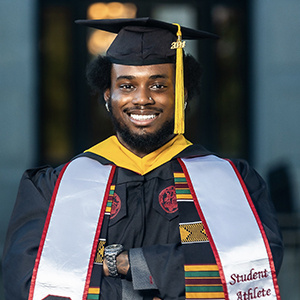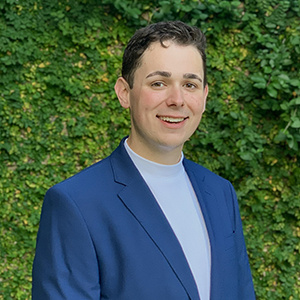The ability to use data to make decisions, create strategies and tell stories has become an essential skill for all communications professionals. And today’s employers are looking for communication experts who can give them a competitive edge using those skills. The Master of Science in Data and Communication was created for professionals who want to update their skills and students who want the most up-to-date skills as they enter the job market. The first class of MDC students, who graduated in May of 2024, includes individuals in fields as diverse as football and fundraising.
The MDC program was created largely through the efforts of Sabrina Habib, Ph.D., who teaches in the School of Journalism and Mass Communications.
Habib says one of the things that they realized is because they had the two schools in the college — the information school and the journalism school — they already had the two components: data and communications. “It's just that they were separate. And so, I said this can this be the first college-wide degree that combines both schools.”
Meet two graduates of the Data and Communication program
Terrell Dawkins - Finds the edge on the football field, has an edge in his career

If the National Football League doesn’t work out for former Gamecock defensive end Terrell Dawkins, he’s convinced that his MDC from the college has prepared him for a career outside football. And if the NFL does work out, his degree has also prepared him for life after professional football.
If a professional football career works out for Dawkins he says he wants “to use the capital that I get from the NFL” and eventually branch off and into some type of marketing or data analytic company where he can use the skills he has acquired through his degree.
“And let's say the NFL doesn't work and I have to find a job,” Dawkins says. Then his master’s program can help in looking for a job. “I could apply for jobs because I have a knowledge of programming, AI and data communication.” Communications professionals need to know how to analyze and visual data.
He was also attracted to the fully online nature of the MDC program. “That was a big thing for me too. And then also in high school, I had a background in coding and doing things of that nature.”
Dawkins has two years of eligibility left and has once again entered the transfer portal looking for an opportunity to conclude his collegiate athletic career.
Brenan Dimery – Building customer relationships, one data set at a time

Enhancing his workplace skills is exactly what drew Brenan Dimery, another of the program’s first graduates of the MDC. A 2022 graduate of the Darla Moore School of Business at USC in finance and management, Dimery works as an analyst in the Analytics & Client Solutions division at Giving at South Carolina, part of business services in USC’s development office.
“I got my Master of Data and Communication because that aligned with what I was doing in the Office of Business Services,” Dimery says. In his work he assists with fundraising and alumni relations, using data and the university’s Customer Relationship Management or CRM system “to make decisions on how they should solicit and how they should recruit people,” Dimery says. The program is relevant to the work he does on a daily basis.
Since he is a data analyst, he is focused more on the data side of the program than the communication side. “But of course, with the communication side, you can never learn enough about how to communicate to people in the proper way,” he says, adding that he definitely learned more about communications and “more specifically I learned about applying it to data, how to communicate data in a way that people understand.”
Using data analytics to drive decisions
The Master of Data and Communication program brings together the core strengths of the schools that make up the College of Information and Communications. Through information science, students are able to understand data analytics, finding meaning in the numbers. Knowledge of communications aids them in turning those insights into stories that are easily understood by stakeholders and leadership. These skills strengthen an organization’s ability to make decisions that will be beneficial in the long run.
CIC Dean Tom Reichert says, “This program brings together strengths from both our schools to offer a degree that is in high demand. It is a very tangible result of cooperation between our two strong schools. This degree offers cutting-edge, job-ready skills that are necessary in the workplace.”
In the capstone class, students work on real client problems and solve them. Habib says, “They're given a problem, they're given a data set and they have to be able to strategize, communicate and show mastery of data storytelling, of data strategy, of data communication.” Students have to “show how they can take all of that large information and turn it into something that they can communicate to others in a way that makes sense. That's what they're doing. It is hands on, and it's wonderful.”
